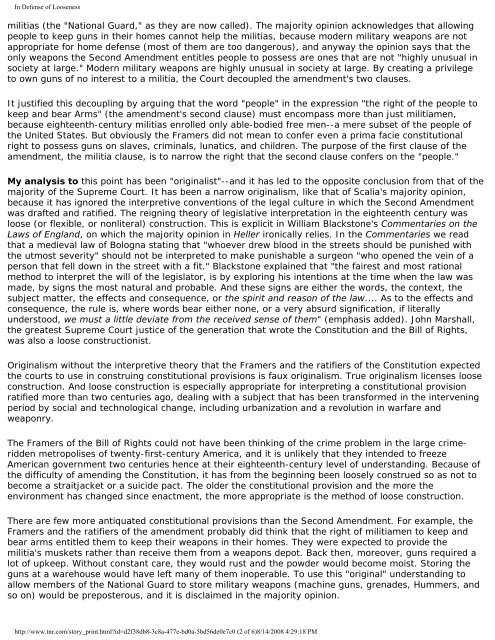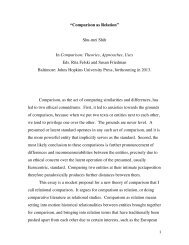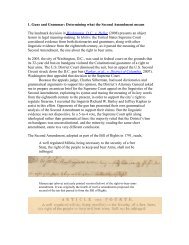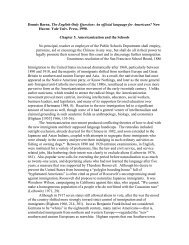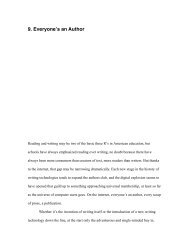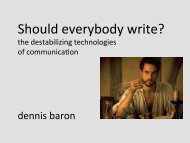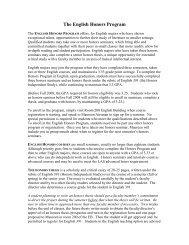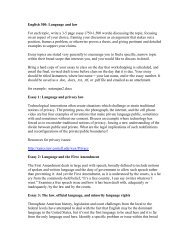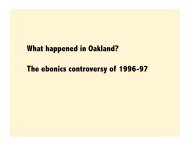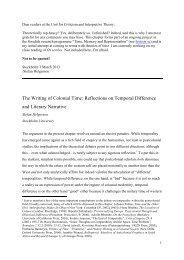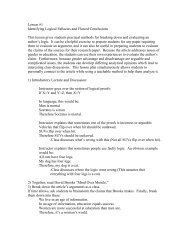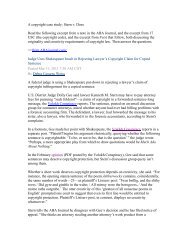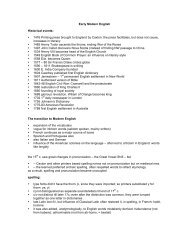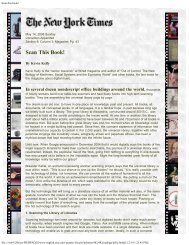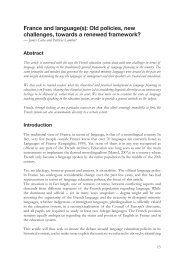Richard Posner: In Defense of Looseness - English
Richard Posner: In Defense of Looseness - English
Richard Posner: In Defense of Looseness - English
Create successful ePaper yourself
Turn your PDF publications into a flip-book with our unique Google optimized e-Paper software.
<strong>In</strong> <strong>Defense</strong> <strong>of</strong> <strong>Looseness</strong>militias (the "National Guard," as they are now called). The majority opinion acknowledges that allowingpeople to keep guns in their homes cannot help the militias, because modern military weapons are notappropriate for home defense (most <strong>of</strong> them are too dangerous), and anyway the opinion says that theonly weapons the Second Amendment entitles people to possess are ones that are not "highly unusual insociety at large." Modern military weapons are highly unusual in society at large. By creating a privilegeto own guns <strong>of</strong> no interest to a militia, the Court decoupled the amendment's two clauses.It justified this decoupling by arguing that the word "people" in the expression "the right <strong>of</strong> the people tokeep and bear Arms" (the amendment's second clause) must encompass more than just militiamen,because eighteenth-century militias enrolled only able-bodied free men--a mere subset <strong>of</strong> the people <strong>of</strong>the United States. But obviously the Framers did not mean to confer even a prima facie constitutionalright to possess guns on slaves, criminals, lunatics, and children. The purpose <strong>of</strong> the first clause <strong>of</strong> theamendment, the militia clause, is to narrow the right that the second clause confers on the "people."My analysis to this point has been "originalist"--and it has led to the opposite conclusion from that <strong>of</strong> themajority <strong>of</strong> the Supreme Court. It has been a narrow originalism, like that <strong>of</strong> Scalia's majority opinion,because it has ignored the interpretive conventions <strong>of</strong> the legal culture in which the Second Amendmentwas drafted and ratified. The reigning theory <strong>of</strong> legislative interpretation in the eighteenth century wasloose (or flexible, or nonliteral) construction. This is explicit in William Blackstone's Commentaries on theLaws <strong>of</strong> England, on which the majority opinion in Heller ironically relies. <strong>In</strong> the Commentaries we readthat a medieval law <strong>of</strong> Bologna stating that "whoever drew blood in the streets should be punished withthe utmost severity" should not be interpreted to make punishable a surgeon "who opened the vein <strong>of</strong> aperson that fell down in the street with a fit." Blackstone explained that "the fairest and most rationalmethod to interpret the will <strong>of</strong> the legislator, is by exploring his intentions at the time when the law wasmade, by signs the most natural and probable. And these signs are either the words, the context, thesubject matter, the effects and consequence, or the spirit and reason <strong>of</strong> the law.... As to the effects andconsequence, the rule is, where words bear either none, or a very absurd signification, if literallyunderstood, we must a little deviate from the received sense <strong>of</strong> them" (emphasis added). John Marshall,the greatest Supreme Court justice <strong>of</strong> the generation that wrote the Constitution and the Bill <strong>of</strong> Rights,was also a loose constructionist.Originalism without the interpretive theory that the Framers and the ratifiers <strong>of</strong> the Constitution expectedthe courts to use in construing constitutional provisions is faux originalism. True originalism licenses looseconstruction. And loose construction is especially appropriate for interpreting a constitutional provisionratified more than two centuries ago, dealing with a subject that has been transformed in the interveningperiod by social and technological change, including urbanization and a revolution in warfare andweaponry.The Framers <strong>of</strong> the Bill <strong>of</strong> Rights could not have been thinking <strong>of</strong> the crime problem in the large crimeriddenmetropolises <strong>of</strong> twenty-first-century America, and it is unlikely that they intended to freezeAmerican government two centuries hence at their eighteenth-century level <strong>of</strong> understanding. Because <strong>of</strong>the difficulty <strong>of</strong> amending the Constitution, it has from the beginning been loosely construed so as not tobecome a straitjacket or a suicide pact. The older the constitutional provision and the more theenvironment has changed since enactment, the more appropriate is the method <strong>of</strong> loose construction.There are few more antiquated constitutional provisions than the Second Amendment. For example, theFramers and the ratifiers <strong>of</strong> the amendment probably did think that the right <strong>of</strong> militiamen to keep andbear arms entitled them to keep their weapons in their homes. They were expected to provide themilitia's muskets rather than receive them from a weapons depot. Back then, moreover, guns required alot <strong>of</strong> upkeep. Without constant care, they would rust and the powder would become moist. Storing theguns at a warehouse would have left many <strong>of</strong> them inoperable. To use this "original" understanding toallow members <strong>of</strong> the National Guard to store military weapons (machine guns, grenades, Hummers, andso on) would be preposterous, and it is disclaimed in the majority opinion.http://www.tnr.com/story_print.html?id=d2f38db8-3c8a-477e-bd0a-5bd56de0e7c0 (2 <strong>of</strong> 6)8/14/2008 4:29:18 PM


